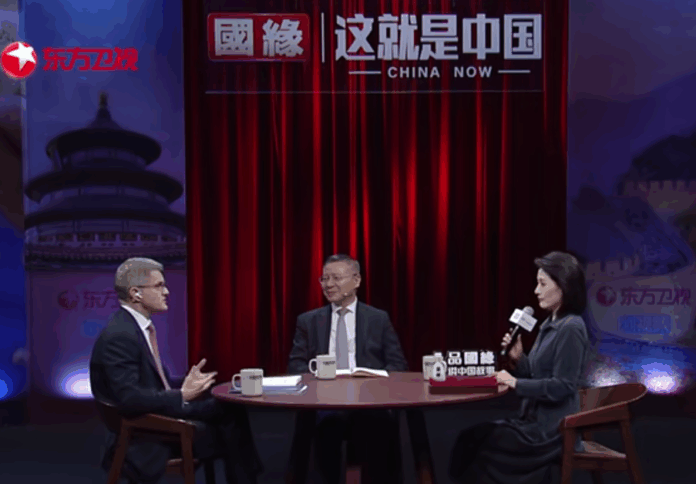
On China Dragon TV’s China Now program, Professor Zhang Weiwei, Director of Fudan University’s China Institute, and Mr. Vuk Jeremić, former Serbian Foreign Minister and President of the UN General Assembly, recently discussed the future of Europe together.
Vuk Jeremić believes the European Union, born from the devastation of World War II and founded on reconciliation and shared prosperity, now stands at a critical crossroads. Once united by the vision of peace between France and Germany and supported by the United States during the Cold War, the EU became a model of integration and cooperation after 1991. However, Jeremić argues that a sense of complacency and arrogance emerged after the Cold War, as the EU assumed history had ended.
He sees the crises of the 21st century—the financial crash, the 2015 refugee crisis, Brexit, and deteriorating relations with Russia—as evidence of deep structural weaknesses within Europe. Today, he believes the EU faces major challenges: economic stagnation, demographic decline, social division, and uncertainty in its relationships with major global powers, including the U.S., Russia, and China.
Despite these difficulties, Jeremić maintains that the EU remains the most successful example of regional integration in modern history and that its founding ideals of unity and shared destiny still hold the key to Europe’s future.
What is the most urgent challenge facing the EU and Europe today?
Vuk Jeremić: The most pressing issue is that Serbia’s EU accession process, which began in 2001, has effectively stalled. While Serbia formally remains a candidate and is expected to implement reforms to meet EU standards, progress is blocked by powerful EU countries demanding it compromise its sovereignty over Kosovo—a condition Serbia considers both constitutionally and morally unacceptable. No country could accept such terms. As a result, Serbia remains outside the EU, despite being geographically surrounded by member states, and there is little chance this situation will change in the near future. This, in my view, is the core challenge facing Serbia’s European integration.
Zhang Weiwei: Years ago, I spoke with a Serbian ambassador to Geneva about Yugoslavia and its relations with Europe. He suggested that if Tito had lived longer, Yugoslavia might have joined the European Community, which could have helped prevent its fragmentation, as membership in an international organization supports unity and protects collective interests. Later, I asked Vuk whether he thought this was a real possibility.
Vuk Jeremić: It’s impossible to know for certain what might have happened if Tito had lived longer. Perhaps, had Yugoslavia implemented reforms similar to China’s in the 1970s and 1980s, the country might have avoided disintegration. Instead, Yugoslavia split into six sovereign states, leaving unresolved issues like Kosovo. Today, these historical realities, combined with the EU’s internal challenges—such as each member state’s veto under the Treaty of Lisbon—make it difficult for a country like Serbia to join. Ultimately, we can only speculate about what might have been if Yugoslavia had remained united.
What challenges are ordinary Europeans facing today? Are issues like unemployment, the refugee crisis, or the decline in industrial and technological leadership among them?
Vuk Jeremić: Most EU countries face a complex mix of crises. Illegal migration, weak economic growth, and long-term demographic decline create deep uncertainty, while the media often exaggerates security threats from Russia. In this climate, many Europeans turn to political figures offering simple, immediate solutions, fueling support for populist movements. These dynamics contribute to the severe political instability and upheaval seen across multiple EU states today.
Zhang Weiwei: Europe’s biggest challenge today is missing the Fourth Industrial Revolution driven by the internet and digital economy. None of the world’s top 20 internet companies are European, leaving big data and platforms dominated by the U.S. Even Germany’s Industry 4.0 initiative, once a model for industrial intelligence, has faded into obscurity. Energy is another critical issue: the phase-out of nuclear and coal, combined with insufficient green alternatives, has created a significant power shortage—estimates suggest Germany’s industrial sector faces a 30% deficit—undermining economic competitiveness.
Why did Europe miss the information revolution, and how did it fail to seize these key opportunities for growth?
Vuk Jeremić: This issue stems from several factors. First, Europe’s energy landscape shifted dramatically: Germany phased out nuclear power after Fukushima, and strained relations with Russia cut off cheap energy, driving production costs up. Second, heavy bureaucracy, regulation, and high taxes have pushed innovators and tech talent abroad, leaving Europe’s internal innovation ecosystem underdeveloped. Third, Europe’s reliance on imports—especially from China—for key technologies revealed vulnerabilities when geopolitical and national security concerns limited access. Together, these factors explain Europe’s current economic and technological challenges.
Why does Europe seem reluctant to deepen cooperation with China?
Vuk Jeremić: I come from Serbia, a European country with distinct differences from mainstream EU states, and I currently teach at Sciences Po Paris and the University of Salzburg. I believe Europe and China share substantial long-term interests, but current political factors, especially the war in Ukraine, complicate cooperation. European media portrays Russia as an imminent threat, which I do not believe is accurate. Yet as long as Europeans perceive this threat, they rely on U.S. protection, which carries conditions—particularly regarding China. This dynamic creates a short-term obstacle to Europe-China cooperation, even though the long-term shared interests remain significant.
Source: China Dragon TV



